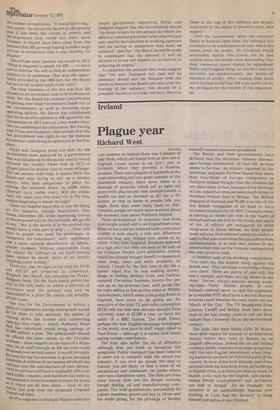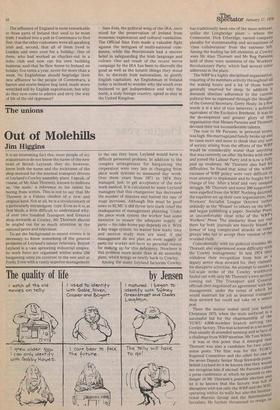Plague year
Richard West
Dublin Last summer in Ireland there was a plague of lady-birds, which are feared here as they are in England ()four house is on fire') and in Germany where they portend a Russian invasion. There were plagues of ladybirds in the years preceeding the two great famines of the nineteenth century. Once more there is a shortage of potatoes, which sell at eight old pence each, plus ten per cent unemployment, a wealth tax and an increase to £27 for a TV licence, so that to listen to people talk you might think they were really back to 1847. Certainly people are much more worried about the economy than about Northern Ireland.
• These protestations of economic woe from Irish people sound odd to an Englishman's ear. What we have always believed to be a very poor country is new clearly a rich one. 'Whatever statistics may say, Ireland now seems to be rather richer than England. Potatoes may sell at a high Price but they are soon to be part of the Common Market price guarantee system which has already brought benefit to farmers of other crops, meat and dairy products. In Galway I heard for the first time in my life a farmer admit that he was making money. Shops in Dublin, Belfast, Cork and Galway reported Christmas business twenty-five per. cent up on the previous year, with goods like fur coats selling as fast as they came in. Middle class incomes, which seem to be going down in England, here seem to be going up. An executive of the Irish TV and radio corporation (RTE) tells me that new recruits straight from university 'start at £5,200 a year, or twice the salary of a BBC trainee. The Irish Times, perhaps the best English-language newspaper in the world, now pays its staff wages equal to Fleet Street — although it is rather slow about paying outside contributors. • The Irish also suffer the ills of affluence although they are loath to recognise the symptoms. Public transport has been reduced in order not to compete with the motor car industry; if you ever go across the seas to Galway you are likely to find a mass of oil installations and mammoth car parks where once was a handsome town. The Irish are even more craven than are the British towards foreign mining, oil and manufacturing companies. The Irish government, particularly its Labour members, grovel and beg to Alcan and the Asabi group, for the privilege of having Ireland's natural resources plundered.
The British and Irish governments have declared that the sectarian violence discour ages foreign investment. In fact the reverse seems to be true. An inquiry reported in the American magazine Fortune found that more than two-thirds of foreign companies in Northern Ireland thought that the troubles did not affect them; in fact, because of the shortage of jobs, industrial relations were much better in Northern Ireland than in Britain. The Belfast shipyard of Harland and Wolff was one of the few British companies of its kind to have increased productivity in 1975. Unemployment is running at twenty per cent in the North of Ireland and ten per cent in the South, but much of the ill effects are mitigated by Irish emigration to Great Britain. As Irish people freely tell you, their national solidarity makes it easy to find jobs even when Britain suffers from unemployment: it is said that orders to the construction men on the Victoria underground line were given in Irish.
A Dubliner said of his drinking companions: "You can't say the mildest thing against the British now. They all think everything's better 'over there'. There are plenty of jobs still, the beer's cheaper, and there are leg shows in the clubs." Soccer, always popular among work ing-class North Dublin people, is now Ireland's national sport, so that the argument as to whether RTE shall have a second channel revolves round whether the west coast can see 'Match of the Day'. The TV broadcasts from London, Cardiff and Belfast must have done more in the last twenty years to rub out Irish culture than Cromwell did in the seventeenth century.
The Irish, like their fellow Celts in Wales, show little regard for natural or architectural beauty, which they tend to dismiss, as an English affectation. Indeed the oil and mining company public relations men make great play with this anti-English resentment when foist ing barbarous projects on beautiful parts of the country. In view of this Irish attitude, and of the national talent for knocking down old buildings in English cities, it is fortunate that so much of Dublin, a city built by the English, still stands.
Indeed British town-planners and architects can look to Ireland for an example: the architect of an outstandingly hideous new building in Cork had the decency to hang himself just before it was finished. The influence of England is most remarkable in those parts of Ireland that used to be most Irish. I walked into a pub in Connemara to find first, that the other customers were all speaking Irish and, second, that all of them lived in London and were over for a holiday. One of them, who had worked as chucker-out in a Soho club and now ran his own building business, said that he flew home to Ireland on holiday five times a year, never for more than a week. No Englishman should begrudge their new affluence to the people of Connemara, a barren and storm-beaten bog-land, made more wretched still by English exploitation; but why do they now come to admire and envy the way of life of the old oppressor? Sinn Fein, the political wing of the IRA, once stood for the preservation of Ireland from economic exploitation and cultural vandalism. The Official Sinn Fein made a valuable fight against the intrigues of multi-national companies, while the Provisionals had a sincere belief in safeguarding the Irish language and culture. One sad result of the recent terror campaign by the IRA has been to discredit the good as well as the lunatic things they stood for, to discredit Irish nationalism, to glorify English capitalism. An Englishman in Ireland today is inclined to wonder why the south ever bothered to get independence and why the north, a truly foreign country, opted to stay in the United Kingdom.



























 Previous page
Previous page